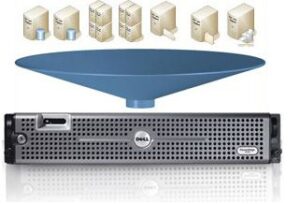Much confusion surrounds the pros and cons of hosted or cloud-based telephone systems. We try and boil it down here.
In the world of phone systems, you basically have two flavours:
- A traditional on-site PBX
- A cloud-based or hosted PBX using VOIP
In simple terms, the ‘traditional’ way of doing things was to have a phone system on your premises. This box of kit connects up all your phone extensions, and links them to the public phone network, often using PSTN or ISDN telephone lines. Typically a phone system would be a capital purchase with a one-off up-front cost. Note that an on-site system can also link to VOIP services, to make a kind of hybrid system, which gives the benefits of an on-site system with the cost savings of internet phone calls.
A cloud system, often called a hosted phone system, uses the internet to connect up all your extensions to each other, and the public phone network. A hosted system is usually billed on a monthly basis. So there are no significant up-front costs.
I think it’s important to clarify terms like VOIP and SIP. These are often linked to hosted systems, as SIP is the protocol, or language used by the handsets to talk to the phone system in the cloud. I find people often associate these terms with reduced call costs and cost savings, which is true, as it generally costs less to route phone calls over the internet using VOIP, however this is not exclusive to hosted phone systems.
Let’s look at how these two options compare…
Cost
An on-site system generally has a higher up-front cost, as you have to purchase the equipment. The costs can often be spread by leasing however. A hosted system usually has a small setup cost, and you will need to purchase handsets, unless they are included as part of a long-term contract. Hosted systems attract a monthly rental cost per extension, so with a high number of users over a period of time, the costs may well pay for the cost of an on-site solution.
Usability and Features
A hosted system usually provides access to all the key features you would require such as call transfer, voicemail, ring groups and hunt groups. However adding such features often attracts extra costs. An on-site solution, depending on the model and equipement will generally offer much more flexibility in terms of the configuration of the system and how your calls are handled.
Stability
On-site systems have a big advantage here. An on-site solution will often connect to the public network using PSTN (analogue) or ISDN (digital) phone lines from a provider such as Computercentric. These lines have a very high stability, high uptime, and faults on them are usually resolved rapidly. An ISDN line can come with a business grade care package and SLA (Service Level Agreement) to guarantee the uptime of the line. Note that most modern on-site system can also connect to the public phone network using a VOIP trunk over the internet. If that is the case, then the stability of the VOIP line is at the mercy of your internet connection. Whereas an on-site system can use VOIP, a hosted solution is entirely dependent on VOIP. That’s why pure hosted systems are less reliable and less stable, as they rely completely on your internet connection in order to work. If your broadband is a bit flaky and often drops, then you should probably steer clear of VOIP. If you get a good connection in your area, and you’re happy that you may lose your phone calls when your broadband goes off, then a hosted system can offer benefits.
So Which is Best?
As you might have gathered, there’s no simple answer to this. Which is best depends on your business, your expectations and requirements, and of course, your internet connection!
For a small business with simple requirements and a stable internet connection, a hosted solution offers low up-front costs and a manageable monthly fee. For a business with more than a handful of users, that is reliant on phone calls, an on-site system may be the better choice.
I often come across customers who have been brainwashed into thinking that either hosted or on-site is much better that the other. There’s a reason for this bias, but it’s not a good one! Traditional telecoms installers will generally steer clear of VOIP and newer technologies in favour of what they know and love, good old fashioned cables and copper wires. If you find a telecoms installer who knows and understand VOIP well, it’s a rare thing in our experience. On the flip side, the companies who only sell hosted solutions are generally newer companies who don’t necessarily come from a telecommunications background. They’re often internet companies or companies with an involvement in the computer market as such they don’t want to sell you an on-site system! Computercentric do things differently.
Choice is Always Better
Computercentric have our fingers in both pies! We know and understand traditional on-site systems as we have staff with lots of experience in on-site systems from manufacturers like Siemens, Avaya, NEC and Panasonic. We also sell and support cloud-based hosted solutions as we’re computer geeks, and like new technology that makes our customers’ lives easier! In that respect, we’re completely impartial. If we think one type of system is the best choice for your business, we’ll tell you. We’ll even provide quotes for both options if you like.
If you have any questions, or would like us to quote for a system for your business, please get in touch.








